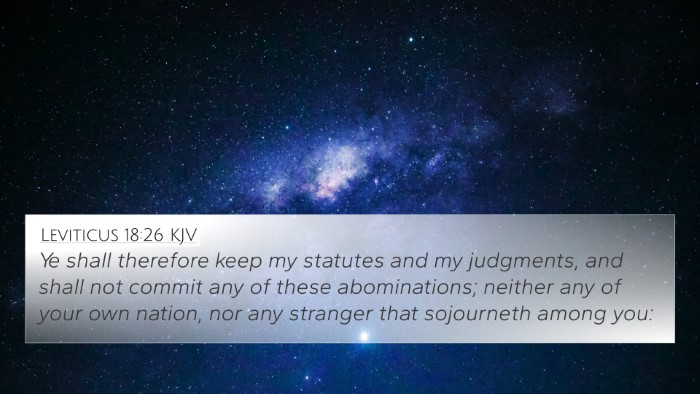Understanding Leviticus 18:30
Bible Verse: Leviticus 18:30 - "Therefore shall ye keep my ordinance, that ye commit not any one of these abominable customs, which were committed before you, and that ye defile not yourselves therein: I am the LORD your God."
Summary of Leviticus 18:30
Leviticus 18:30 serves as a concluding admonition from God to the Israelites, emphasizing the importance of adhering to divine commandments and avoiding the corrupt practices of nations surrounding them. This verse is a call to purity and dedication, marking a clear distinction between what is holy and what is detestable in God’s sight.
Biblical Context
This verse is set within a larger framework of laws concerning morality and sexual conduct, calling the Israelites to maintain their covenant purity. The customs referred to are those associated with pagan rituals that counter the foundational covenant principles established by God.
Commentary Insights
- Matthew Henry: Emphasizes the seriousness of God’s commandments and underscores the negative consequences of failure to uphold the covenant. Henry points out that these abominations lead to defilement, which separates God’s people from Him.
- Albert Barnes: Offers insight into the importance of maintaining separation from the customs of neighboring nations. Barnes notes that familiarity with pagan practices can lead to moral decay and disobedience to God's laws.
- Adam Clarke: Discusses the historical and cultural implications of the customs denounced in this verse. Clarke elaborates on the significance of obedience and the necessity of distinguishing oneself as a follower of God in a corrupted world.
Key Themes and Lessons
The central themes in Leviticus 18:30 include:
- Covenant Faithfulness: Implicit in this verse is the call to remain faithful to God's ordinances as part of the covenant relationship.
- Discernment: Believers are urged to discern between holy practices and those that are deemed abominable.
- Spiritual Purity: The call to maintain purity in all aspects of life reflects the overarching theme of holiness in Levitical law.
Bible Verse Cross-References
To deepen the understanding of Leviticus 18:30, the following Bible passage cross-references can be considered:
- Exodus 20:3-17 - The Ten Commandments, illustrating foundational ethical laws.
- Deuteronomy 12:29-31 - A warning against adopting pagan practices.
- Leviticus 20:23-26 - Emphasizing the need for separation from other nations.
- 1 Peter 1:16 - "Be holy, because I am holy," reaffirming the call to purity.
- Romans 12:2 - Encouraging believers not to conform to the patterns of this world.
- Galatians 5:19-21 - A list of behaviors that disqualify one from inheriting the kingdom of God.
- Ephesians 5:5 - A reminder of the consequences of immoral practices.
Connecting Themes in Scripture
The thematic connections between Leviticus 18:30 and other scriptures are crucial for a deeper understanding of biblical intentions:
- Exploration of holiness as a divine requirement across both the Old and New Testaments.
- Identification of practices that lead to divine displeasure, as noted throughout prophetic literature.
- Study of the New Testament's reflections on the importance of ethical living (e.g., Sermon on the Mount).
Thematic Bible Verse Connections
Several Bible verses provide additional context and thematic parallels:
- 2 Corinthians 6:17 - "Come out from among them and be ye separate," supporting the theme of separation from sinful practices.
- James 4:4 - Admonishing friendship with the world as enmity with God.
- Colossians 3:2 - "Set your affections on things above," indicating a focus on spiritual matters rather than earthly customs.
Practical Applications
Understanding Leviticus 18:30 has significant implications for contemporary life:
- Holistic Integrity: The call to live in a manner consistent with God’s commands encourages a holistic approach to integrity.
- Cultural Awareness: Engaging with and understanding the surrounding cultural practices can safeguard against moral decline.
- Community Accountability: Fostering a community that emphasizes scriptural obedience strengthens collective faith and purity.
Conclusion
Leviticus 18:30 encapsulates a core message of obedience and separation from corruption. By examining the connections between this verse and others, believers can better appreciate the importance of adhering to divine guidelines, thus remaining in fellowship with God. Engaging in cross-referencing biblical texts can enrich one’s understanding and strengthen their faith.








